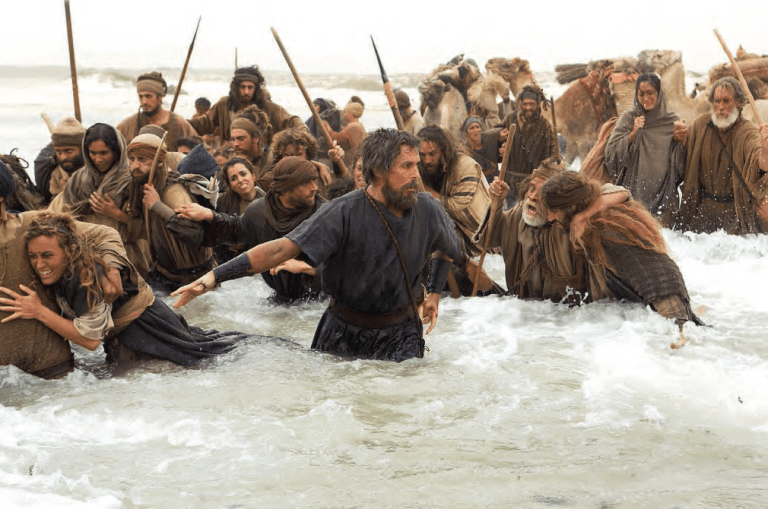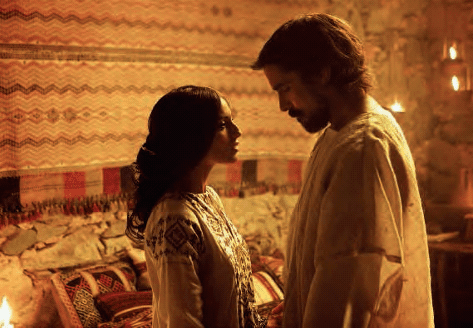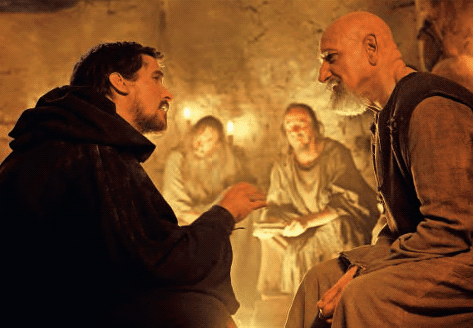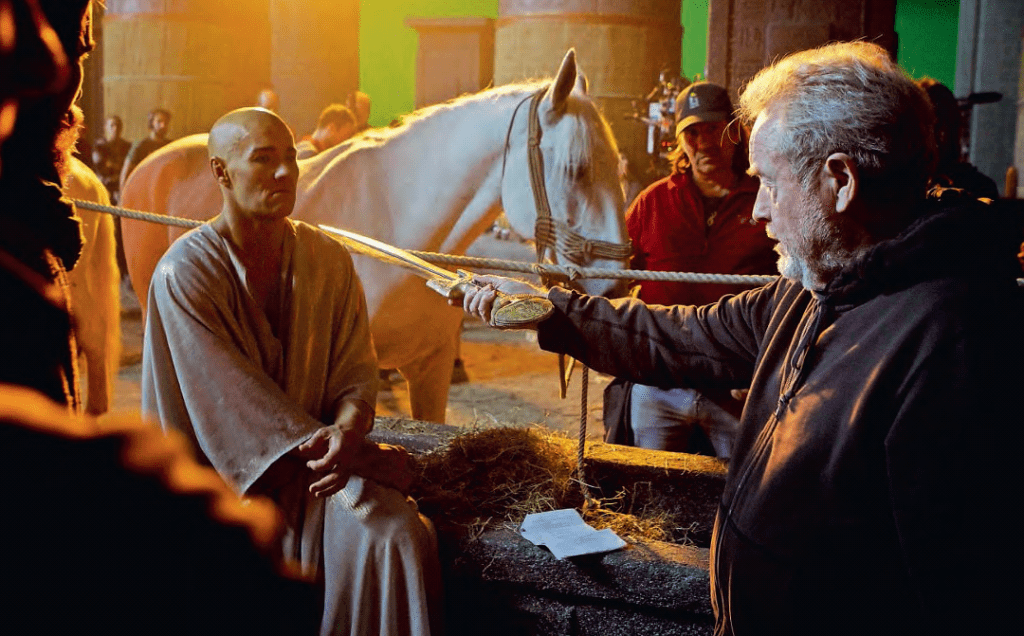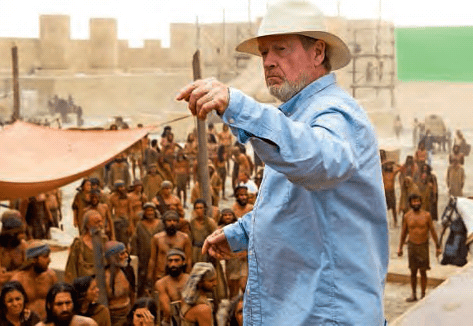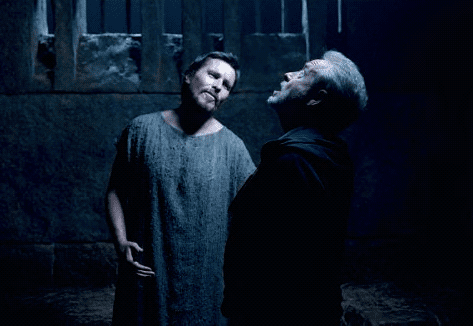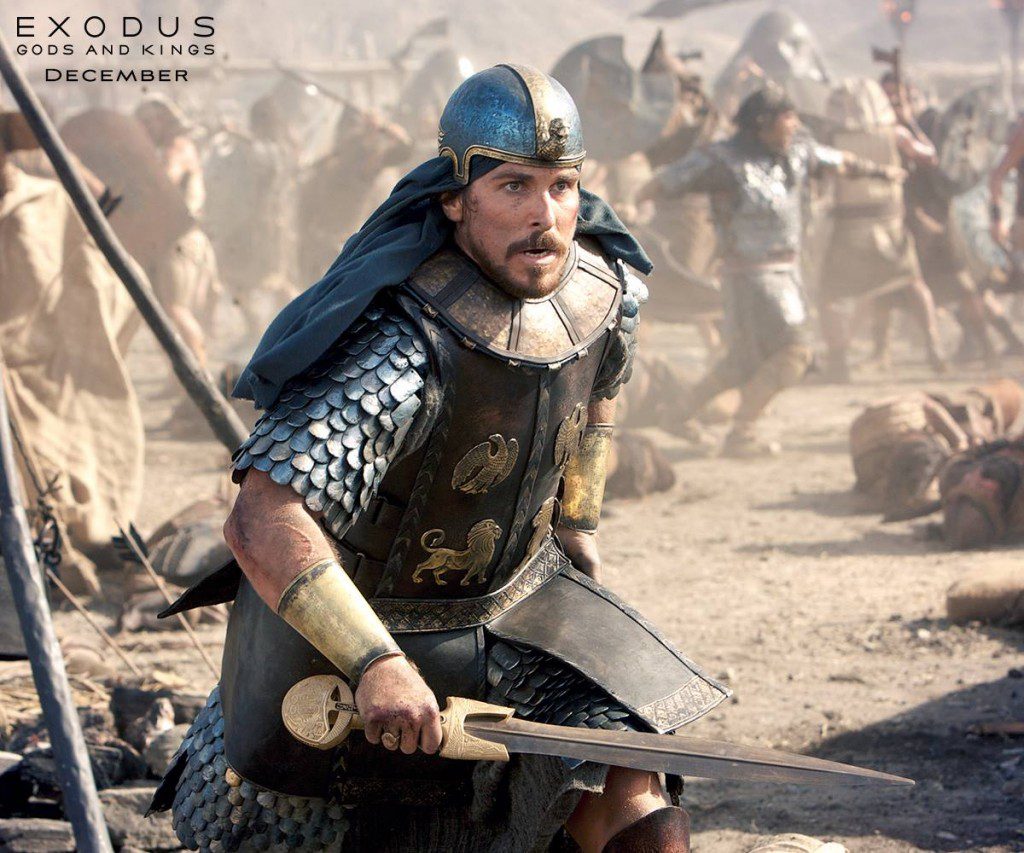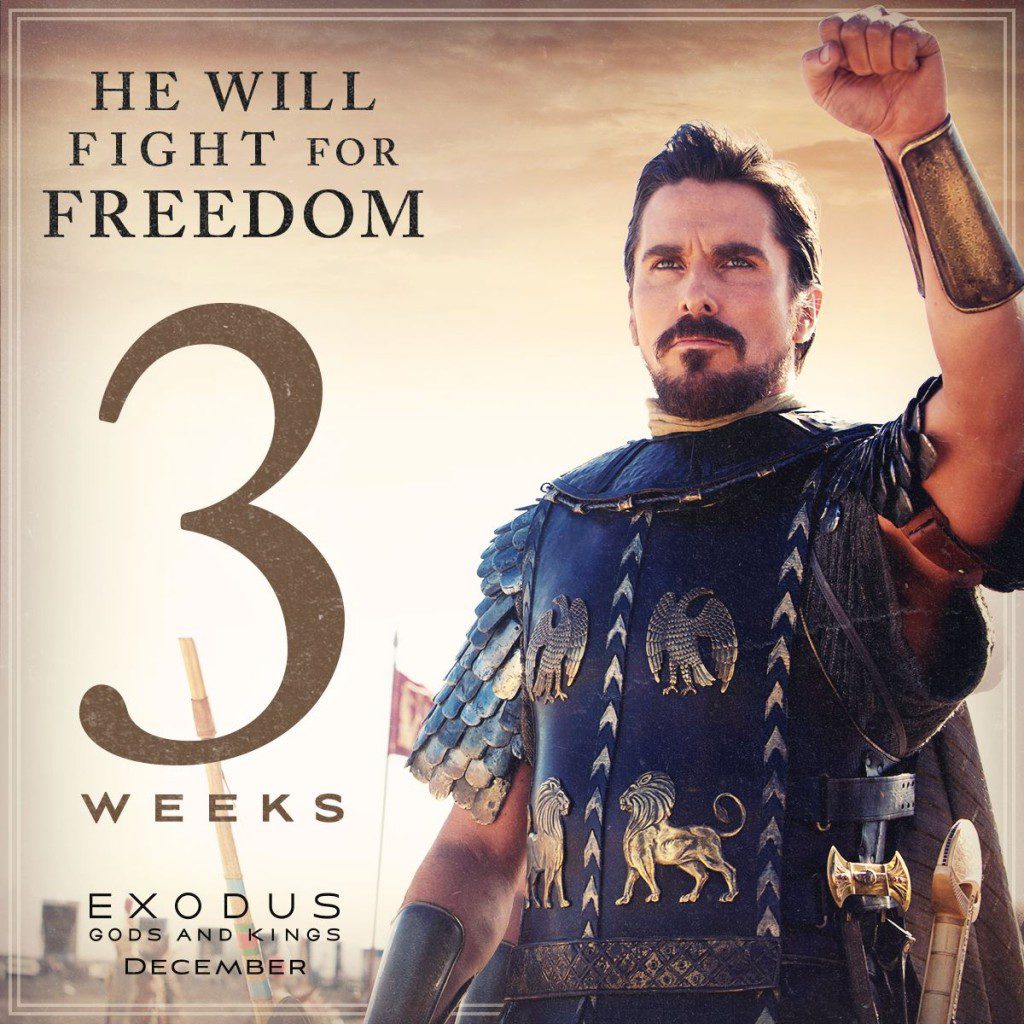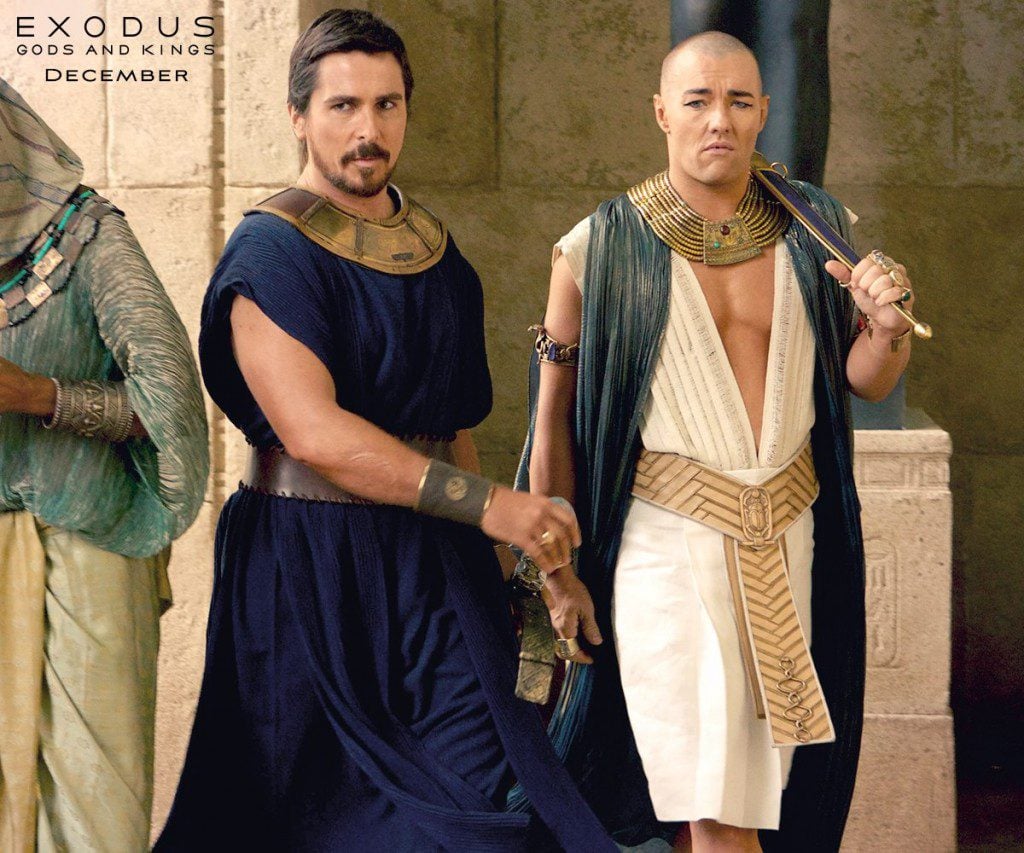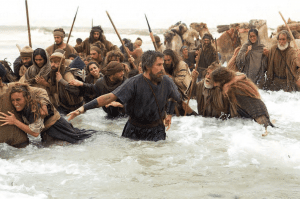 Time to round up some Exodus: Gods and Kings interviews.
Time to round up some Exodus: Gods and Kings interviews.
First, Entertainment Tonight has a few brief soundbites from Christian Bale, in which, among other things, he makes the first public comments I have heard him make on the controversy over the casting of Caucasians in the key roles.
ET also has some behind-the-scenes footage of Bale as Moses shouting “You’ll never make it back! We will not harm you!” — to Egyptians fleeing the Red Sea tsunami, perhaps? — and, even more interestingly, they have a shot in which we can hear the 11-year-old boy who’s playing the voice of God call to Moses as “Moshe, Moshe.”
Here is the ET report itself:
Next, Empire magazine has a new feature on the film, in which Bale makes some interesting comments about his first experience reading the Torah:
“The first thing that surprised me was how human not only Moses is but God is as well,” he says. “They fight, they have bust-ups. It’s almost like God has to prove himself. And it’s bloody violent. Egypt is really a fascist state. Pharaoh (Joel Edgerton) is believed to be a god, so he’s brazen and has a very harsh outlook on life. And this is a place where life is very cheap. I wouldn’t bloody last a second.”
The result was some pruning, for length reasons as much as to avoid a celluloid bloodbath. “There was talk about how much we could tell, but for a start, we’d end up making a six hour-long film. There are these hideous massacres that happen later on in Moses’ life, and you don’t get that. [The Bible’s] not for kids. It really isn’t. I wouldn’t want my daughter reading it.”
Ridley Scott also makes a comment that suggests he’s still blurring the lines between history and fiction somewhat (the Bible never specifies that Ramses was the Pharaoh of the Exodus, much less that he and Moses were “close”):
“(Exec producer and former Fox head) Peter Chernin sent it to me,” Scott says. “At first my reaction was, because of the subject matter, ‘Well, that’s not really for me.’ But then I began to read it and I was stunned about how little I knew. As I read, I got more and more engaged. Moses was this tough guy, a real character. A military leader and a prince who would never be on the throne, but who was a close friend of Ramses The Great. I wanted to add a caption at the end of the movie saying that he lived to 96 and had many wives and over 200 children. To emphasise that these were real people. You can see Ramses II’s remains if you want to, they’re in New York or Cairo. I think so often with these movies, people think they’re fabricated.”
The article also comes with some new photos:
Next, Bale talked to the Philippine Daily Inquirer about the challenge of making the character of Moses accessible for both believers and skeptics:
First, you get over about being asked by Ridley to play Moses. Then you start to realize, can I truly handle a figure as important as this, who means so much to so many people?
Then you have other people, who are absolutely indifferent and who consider Moses to be irrelevant.
And you are going to encounter people who live and die by their religion and who, in a more light-hearted manner, I compare to the first couple of rows in a Shakespeare play. They are reciting lines as you are doing the play. People who know the story backwards will always ask, “Why didn’t you include this piece, that piece?” I feel that we have given the origin story of Moses in this one, this sort of birth of the prophet-to-be.
But you also have people who are going to say, “Why? Why are you making this film? It’s totally irrelevant. What has it got to do with these times?” I think they will be surprised just how relevant it still is, regardless of whether it was a historical fact—that’s interesting.
But to me, what’s far more interesting is the symbolism of what Moses represents, regardless of whether he really existed…
Speaking to The Australian, Bale — who, the article reveals, did door-to-door evangelism for the Jehovah’s Witnesses when he was a child — stands by his recently-publicized comment that Moses was “barbaric” and likely “schizophrenic”:
Bale describes Moses as having passions that are understandable in some cases but adds he also acted in reprehensible, even “barbaric” ways. “Now we don’t get to all that in the film but to me, when I look at a character I don’t think I’m just doing what’s in the film. I go what’s beyond the film, because that’s what gives a life outside of it.”
The “barbaric” term has already caused Bale some grief but that’s the least of it. He describes Moses’s slaughter of 3000 of his own people, some by pouring down their throats the melted gold from the golden calf, as “sadistic in the extreme”. Then he killed prisoners of war but kept virgin girls so they could be used by his soldiers, Bale continues.
“Right, I’m putting him in the International Criminal Court straight away, right?” he notes. “If he hasn’t been taken out by drone strikes immediately.”
Bale is on a roll. His character’s backstory still pinballing around in his head. He asks how would we react if Moses came into our hotel suite, sat down opposite and said he’d just spoken to God.
“He says ‘Yeah, I hear him all the time. And I see him actually. I’m the only person ever. Only person, ever, who’s seen him.’ What are you going to think?” Another rhetorical question.
The reporter also quotes Ridley Scott to the effect that one man’s freedom fighter is another man’s terrorist (which parallels another recent comment of Bale’s):
Only an hour ago, Scott told me Moses was “a dynamo, a generator, fundamentally of freedom. He felt it had to change. In essence, he was a fundamentalist”.
“In today’s world, he’d be pursued by missiles and jets and creamed. Or not. He was very clever, a very good leader.”
Finally, the Italian website Bad Taste has interviews with producer Mark Huffam and co-star Joel Edgerton, from their set visit over a year ago.
The film’s Facebook page has also posted some new photos since our last update:
It also posted two more videos that are basically just glorified GIFs:
Check out earlier photos and images from Exodus: Gods and Kings here:
- Unofficial photos from the set (October 22, 2013)
- The first two official photos from the film (December 30, 2013)
- Moses runs into battle (January 13, 2014)
- Sixteen photos from Entertainment Weekly, People and others (July 1, 2014)
- The first three posters (July 8, 2014)
- A sword to the throat, spears, and Moses wearing earbuds (July 17, 2014)
- Our first look at Moses’ wife (July 24, 2014)
- Four photos from Empire magazine (August 6, 2014)
- Moses’ armour and Tuya’s headgear in Entertainment Weekly (August 15, 2014)
- The “international cast” via Yahoo! Australia (August 26, 2014)
- Three more photos from Empire magazine (August 28, 2014)
- “It’s an immense production” (September 9, 2014)
- Horses, costumes, and director Ridley Scott directing (September 16, 2014)
- Kadesh-themed countdown to the trailer (September 30, 2014)
- Images from the official website, and others (October 17, 2014)
- Three more posters, plus images from Total Film magazine (October 24, 2014)
- Ten Facebook photos and video-GIFs (November 3, 2014)
- Poster, costume designs, Facebook photos and video-GIF (November 7, 2014)
- Poster, Facebook photos and video-GIF (November 11, 2014)
- Ten Facebook photos and two video-GIFs (November 18, 2014)
And check out earlier videos and my shot-by-shot trailer analyses here:
- The first trailer (July 8, 2014)
- The ‘The World’ featurette (September 3, 2014)
- The ‘Locations’ featurette (September 10, 2014)
- The ‘Costume Design’ featurette (September 17, 2014)
- The ‘Creating the Action’ featurette (September 24, 2014)
- The second trailer (October 1, 2014)
- Micro-interviews with Christian Bale and Ridley Scott (October 17, 2014)
- Interview with Christian Bale and Joel Edgerton (October 21, 2014)
- Interview with Ridley Scott (October 28, 2014)
- The ‘Something Is Coming’ and ‘Two Brothers’ TV spots (November 3, 2014)
- The 3D featurette (November 8, 2014)
- The ‘Out of My Control’, ‘Follow Me’ and ‘Remember This’ TV spots (November 10, 2014)
- The third trailer (November 10, 2014)
- The ‘Strength’ clip (November 11, 2014)
- The ‘Miriam’ clip (November 18, 2014)
- The ‘Ridley’s Epic World’ featurette (November 19, 2014)
- The ‘What Makes You Happy’ clip and the Relevant featurette (November 21, 2014)


